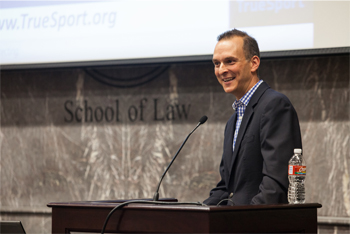© 2013 The Texas Lawbook.
By Mark Curriden
Senior Writer for The Texas Lawbook
(August 27) – Travis Tygart, the SMU Dedman School of Law alum and former Dallas lawyer who led the investigation and prosecution against Lance Armstrong, says there is tremendous pressure today – be it on athletes and business leaders – to do whatever it takes to win, including cheating.
Tygart, who is the chief executive officer of the U.S. Anti-Doping Agency (USADA), told more than 150 SMU law students and faculty members Tuesday that the Armstrong case is the perfect lesson for those on Wall Street that cheaters end up losing.

“It seems like you have to cheat to win today,” he says. “Whether you are an athlete or running a business or practicing law, if you do it by fraud, it is all going to come down at some point.”
The USADA issued a 202-page report last October detailing its decision to ban Armstrong from competition for the rest of his life.
Tygart, a former litigation associate at Fulbright & Jaworski, has been widely praised for his handling and persistence in the Armstrong probe despite a highly organized media and legal campaign opposing investigation – a campaign that frequently attacked Tygart personally.
He received numerous death threats, including one email sent to him from an Armstrong devotee that stated, “I hope you have bodyguards and a bulletproof vest.”
Armstrong’s team effectively used social media by describing the USADA’s inquiry as a “witch hunt” and efforts to get the cyclist and his teammates to cooperate as constitutional infringements on their Fourth Amendment rights against unlawful searches and seizures and Fifth Amendment rights against self-incrimination, Tygart says.
Tygart says the USADA also faced pressure and opposition from the U.S. business community, which developed a financial interest in having Armstrong and other Americans win the Tour de France through sponsorships and other commercial efforts.
There were even efforts to have Congress defund or dismember the organization, he says.
“We knew we could win the legal battle, but we knew we had to win the PR battle because that was about people’s minds and public support,” he says.
Despite Armstrong’s refusal, Tygart says he still holds out hope that the cyclist will meet with him and his team to have a “full and truthful discussion” about his case and identify others involved.
In his presentation Tuesday, Tygart specifically praised U.S. District Judge Sam Sparks of Austin who in July 2012 dismissed a federal lawsuit filed by Armstrong and his legal team that sought a restraining order against the USADA for violating his due process rights.
Judge Sparks said Armstrong’s lawsuit was “excessive” in its “rhetoric” and short on facts.
“The Court is not inclined to indulge Armstrong’s desire for publicity, self-aggrandizement,” Judge Sparks wrote.
USADA oversees anti-doping efforts in the U.S. for the Olympics, Pan American and Paralympic sports and does testing for amateur athletic events across the country.
Tygart says he has seen cases of parents give their eight-year-old swimmer energy drinks immediately before a race to make the child faster and parents who gave their 15-year-old high dosages of testosterone to help make their kid better at rollerblading.
The anti-doping cases against Armstrong and athletes such as Alex Rodriguez combined with efforts by the U.S. Securities and Exchange Commission to pursue high profile corporate targets will hopefully ignite a cultural change, Tygart says.
© 2013 The Texas Lawbook. Content of The Texas Lawbook is controlled and protected by specific licensing agreements with our subscribers and under federal copyright laws. Any distribution of this content without the consent of The Texas Lawbook is prohibited.
If you see any inaccuracy in any article in The Texas Lawbook, please contact us. Our goal is content that is 100% true and accurate. Thank you.
